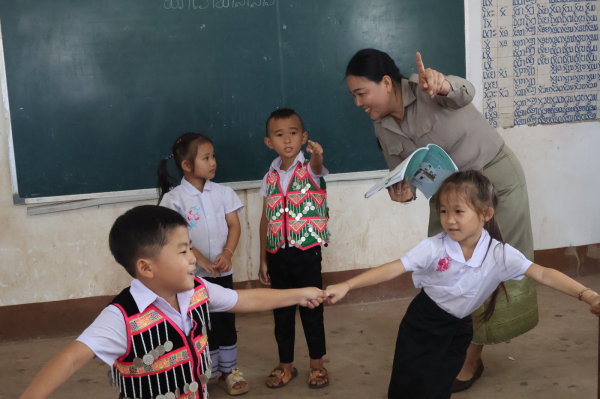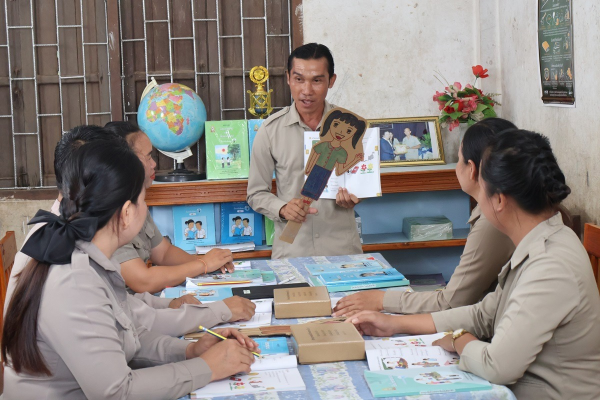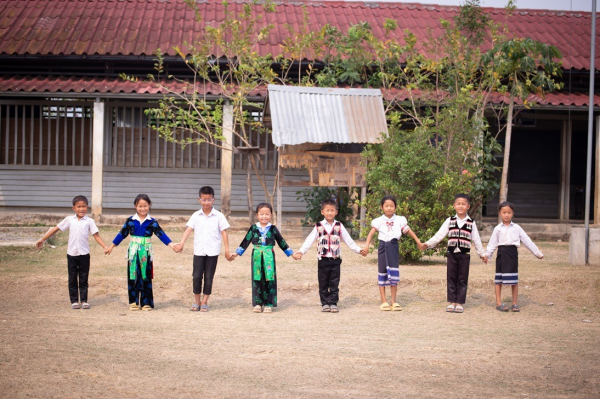ຂປລ
The Lao PDR is a culturally rich and diverse country, with four main ethnolinguistic groups incorporating over 50 languages.
Almost 40% of the Lao population speak a language other than Lao. Many grade 1 students, especially those from remote and disadvantaged areas, begin their first year of school without the necessary oral Lao language skills needed to learn, given that Lao language is the language of instruction.
How can these students effectively learn and participate in classroom activities if they don’t understand the teacher?

Nationwide launch of the new Spoken Lao Programme for non-Lao speaking Grade 1 students
(KPL) The Lao PDR is a culturally rich and diverse country, with four main ethnolinguistic groups incorporating over 50 languages.
Almost 40% of the Lao population speak a language other than Lao. Many grade 1 students, especially those from remote and disadvantaged areas, begin their first year of school without the necessary oral Lao language skills needed to learn, given that Lao language is the language of instruction.
How can these students effectively learn and participate in classroom activities if they don’t understand the teacher?
Starting this school year, grade 1 students across the country who need this additional support will have the opportunity to participate in the Spoken Lao Programme (SLP). This new programme was developed by the Research Institute for Educational Sciences (RIES) in the Ministry of Education and Sports of the Lao PDR (MoES) with support from the Australian Government and the United States Agency for International Development, through the Basic Education Quality and Access in the Lao PDR (BEQUAL) programme. The SLP can be implemented in all grade 1 classes nationwide depending on the language background of the students enrolled.
Grade 1 teachers, principals and districts will decide whether SLP should be taught in a school based on the needs of the enrolled grade 1 students.
SLP lessons are taught in addition to regular timetabled lessons with lessons complementing and linking directly with the regular Lao language curriculum lessons for grade 1.
The SLP lessons focus on developing oral Lao language skills through supporting speaking and listening practice.
Assoc. Prof. Dr. Anoulom Vilayphone, Director General of RIES said, “Since 2019, the MoES and Australia have been working together to strengthen Lao language skills for students starting school without speaking Lao.
The SLP materials have been thoroughly tested in several provinces and subsequently improved since 2019.
The overwhelming positive results demonstrated that this new approach benefits students who are not yet competent speakers of Lao language and helps them acquire new vocabulary in a fun and effective manner.
The Ministry decided to make Spoken Lao materials and teaching method available to all Grade 1 classes nationwide starting with this school year”.
Ms Vanessa Hegarty, First Secretary, Australian Embassy, said “Australia and the MoES collaborated to pilot new teaching methods to increase inclusion of all children in the education system, especially disadvantaged children who speak another language other than Lao at home.
The SLP is a great example of how a successful small pilot can become a programme approved for teaching nationwide.”

In preparation for the national rollout, 184,680 colorful textbooks and 13,680 teacher guides, as well as supplementary teaching and learning materials (13,680 flashcard sets, 27,200 story cards and 27,200 bingo game sets) were distributed nationwide. These materials have been provided to grade 1 teachers and will be available for all schools with non-Lao speaking students who are implementing the SLP.
Teaching a new curriculum is always challenging for teachers. Cascade training started in July and will last until mid-September to equip grade 1 teachers with the tools they need to use the SLP materials and support grade 1 students.
63 Master Trainers (41% female) trained 603 Provincial Trainers who then delivered 530 workshops of 3 days for 14,524 grade 1 teachers, primary school principals and pedagogical support providers. The Master and Provincial Trainers have been delivering curriculum training since the introduction of the revised primary curriculum in 2019; they are skilled in facilitating training and with in-depth curriculum knowledge, gained conducting training on the revised curriculum for five years.
The training included all grade 1 teachers, even the teachers who may not have non-Lao speaking students in their class, to ensure that all grade 1 teachers can provide SLP when required in the future.
One of the Provincial Trainers explains “On Day 1, participants learned about language teaching techniques for children and effective methods to support their students' language learning. They also became familiar with the SLP teaching and learning materials. On Day 2, participants experienced some activities of the programme. They also created a paper puppet and practiced using it for an SLP activity demonstration. The Day 3 was also very active and hands-on with teachers preparing and delivering SLP activities in microteaching sessions, while pedagogical support staff were learning about tools and resources to support SLP teachers.”

Additional opportunities to provide support to SLP teachers are being developed by the Ministry. A video explaining five techniques to teach students who do not speak Lao as their first language is already available on ວິດີໂອສໍາລັບການພັດທະນາຄູ Teacher Development Videos YouTube channel.
A second video demonstrating three main activities of the Spoken Lao Programme was filmed last week and will be released soon. A specific SLP Teacher Support Pack is also under development.
Ms Hegarty concluded “Australia is proud to promote inclusive education and better learning outcomes for non-Lao speaking students. Australia strongly believes that improving the learning outcomes for girls and boys, especially those experiencing disadvantage, will have long-term positive outcomes for the development of Laos.”
BEQUAL is a programme led by the Ministry of Education and Sports with support from the Australian Government and the United States Agency for International Development (USAID). The programme focuses on enhancing educational outcomes for the nation's youth, especially the vulnerable and disadvantaged. BEQUAL is focused on ensuring gender equality and promoting inclusive education across all activities.
KPL